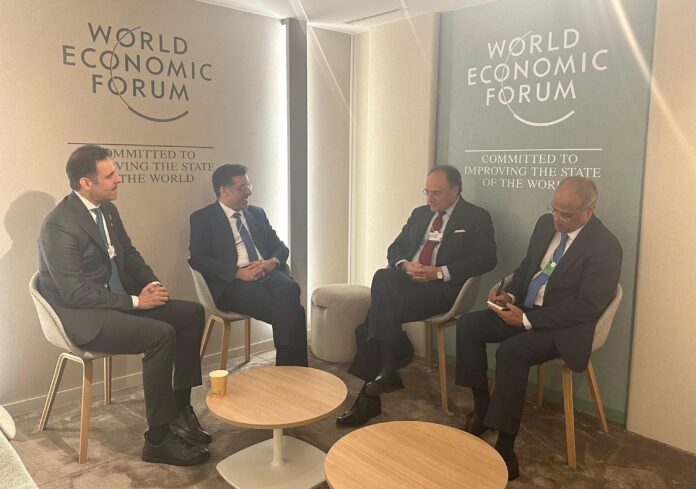Federal Minister for Finance and Revenue, Senator Muhammad Aurangzeb, has invited global stakeholders to invest in Pakistan’s priority sectors, including agriculture, IT, renewable energy, mining, and pharmaceuticals.
The minister extended the invitation through an exclusive article published on the World Economic Forum (WEF) website as part of the annual meeting in Davos. The article emphasized Pakistan’s transformative journey toward economic stabilization and growth.
According to a press release, the minister said, “Confronted with formidable challenges, we implemented decisive reforms to build a robust foundation for sustainable and inclusive development. Today, the results are evident, with the economy demonstrating resilience and renewed potential.”
Reflecting on the economic reforms, Aurangzeb noted that when he assumed office in 2024, Pakistan faced severe fiscal and monetary pressures. Inflation had surged to 38%, foreign exchange reserves barely covered two weeks of essential imports, industrial output had contracted by 10.3%, and GDP growth had plummeted to 0.2%.
Additionally, the compounded effects of COVID-19 and devastating floods, which caused over $30 billion in damages, tested the country’s resilience.
The government’s response included stabilizing the exchange rate, tightening fiscal policies, and curbing inflation through targeted monetary interventions. With the support of the $7 billion IMF Extended Fund Facility (EFF), structural improvements were initiated in key sectors such as energy and taxation. Central to these efforts was the launch of Uraan Pakistan in 2024, an economic transformation plan aiming for export-led GDP growth of 6% by 2028.
The initiative focuses on public-private partnerships, export competitiveness, and optimized public finances in sectors such as agriculture, energy, textiles, pharmaceuticals, and IT. A pivotal component of the plan is a $20 billion collaboration with the World Bank targeting health, education, poverty alleviation, and climate resilience.
Highlighting recent achievements, the finance minister stated that inflation has dropped to 4.1%, foreign exchange reserves now cover over two months of imports, and goods exports have risen by 7.1%. The IT sector has grown by 28% year-on-year, and Pakistan’s global default risk has dropped by 93%. Local and foreign investors, including Aramco, BYD, and Samsung, have shown confidence in the country’s recovery.
Aurangzeb also noted that the Roshan Digital Account initiative has attracted over $9 billion, remittances have hit a record $35 billion, and Pakistan’s equity market has delivered an 87% return in dollar terms. Internationally, Pakistan’s progress has been recognized, with top rating agencies upgrading its sovereign ratings. In September 2024, Moody’s revised Pakistan’s economic outlook to ‘Positive,’ acknowledging the impact of the government’s policy measures.
While celebrating these milestones, the minister acknowledged ongoing challenges, including structural inefficiencies in revenue collection, energy, and state-owned enterprises. He emphasized the importance of rightsizing the federal government, reforming SOEs, and fostering export-led growth to reduce reliance on international funding programs.
Aurangzeb concluded by urging global investors to capitalize on Pakistan’s Special Economic Zones (SEZs) and support its journey toward sustainable growth and regional stability. “With a remarkable workforce, abundant natural resources, and immense production potential, Pakistan is poised to soar to new heights, contributing to regional stability and global economic progress,” he said.
On the sidelines of the WEF meeting in Davos, Aurangzeb engaged in discussions with several global leaders and business executives to strengthen economic partnerships. He met Maroun Kairouz, head of MENA and Deputy Head of the Centre for Regions, Trade, and Geopolitics at WEF, to explore avenues for collaboration, emphasizing Pakistan’s commitment to leveraging international partnerships for sustainable growth.
In a meeting with Mounir Nakhla, CEO of MNT-Halan, the minister highlighted opportunities in digital finance to enhance financial inclusion. Aurangzeb also held discussions with Dr. Rania Al Mashat, Egypt’s Minister for Planning, to exchange insights on economic programs and macroeconomic indicators.
Additionally, Aurangzeb engaged in an informal conversation with Tunisia’s Foreign Minister, Mohamed Ali Nafti, focusing on strengthening bilateral relations.
He also met Saeed bin Mohammad Al Ghamdi, Chairman of the Saudi National Bank, to discuss avenues for financial collaboration and enhance banking ties between Pakistan and Saudi Arabia.
Aurangzeb’s engagements at the WEF underscore Pakistan’s active efforts to attract global investment and strengthen international partnerships, advancing the country’s strategic and economic goals.




